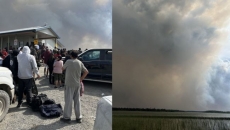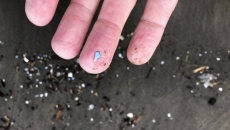RCMP say a traffic stop in British Columbia's southern Interior led to the discovery of about 73 kilograms of cocaine in a vehicle.
Insp. Lori Orstad with B.C. Highway Patrol says their preliminary investigation suggests the discovery earlier this month has "all the earmarks of organized crime."
Police say officers arrested the 28-year-old man from Surrey who was driving the vehicle, and he's since been released with conditions and a scheduled court date.
A statement from police says the traffic stop on Oct. 8 involved a roadblock on the Trans Canada Highway near Malakwa, east of Sicamous.
The driver was alone in the vehicle, which has been seized for the investigation.
Police say the driver will not be identified before the potential approval of charges.






